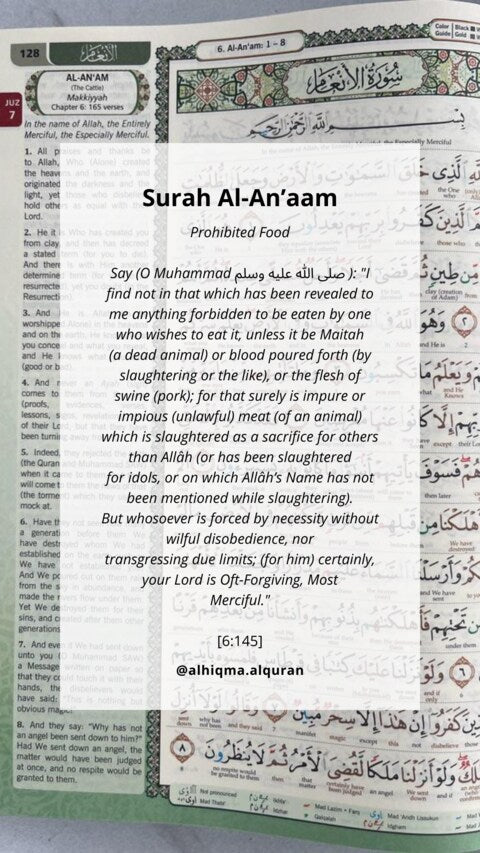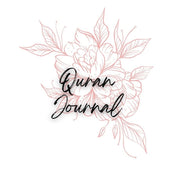Surah Al-An'am 6:145: The Allowances and Prohibitions for Food
This verse means:
Say, "I do not find within that which was revealed to me [anything] forbidden to one who would eat it unless it be a dead animal or blood spilled out or the flesh of swine - for indeed, it is impure - or it be [that slaughtered in] disobedience, dedicated to other than Allah. But whoever is forced [by necessity], neither desiring [it] nor transgressing [its limit], then indeed, your Lord is Forgiving and Merciful."
The key points in this verse are:
-
Allah prohibits eating dead animals, blood, pork and anything slaughtered in disobedience to Him.
-
However, if one is forced by necessity to eat any of these, and eats only as much as required without desiring or transgressing, then Allah is Forgiving and Merciful.
-
The verse establishes clear guidelines on what foods are prohibited and allowed for Muslims. It shows that Islam takes a balanced approach - prohibiting harmful foods but allowing exception in cases of necessity.
Key Takeaways:
-
Quran 6:145 outlines clear guidelines on prohibited and allowed foods for Muslims.
-
Even if compelled by necessity, Muslims should avoid overstepping limits.
-
Allah promises forgiveness for unintentional violations due to dire needs.
-
The verse balances divine law and God's mercy.
Why is this verse important:
The prayer at the end of the verse highlights Allah's attributes of Forgiveness and Mercy. This reminds Muslims that even if they are forced to consume prohibited foods out of necessity, Allah is ready to forgive them if they do so without desire or transgression.
Some key significances of this prayer are:
-
Emphasizes Allah's compassion - He understands difficult situations where prohibited foods may need to be consumed out of necessity.
-
Gives hope and reassurance to Muslims - Even if they fall into error, Allah's grace is still available to them.
-
Promotes moderation - Allowance is given in cases of necessity but transgression is still discouraged.
-
Encourages sincerity - Muslims should avoid prohibited foods out of a sincere desire to obey Allah's commands.
-
Upholds the sanctity of divine law - The prayer confirms that prohibited foods are still forbidden in general.
This prayer teaches Muslims to balance divine law with God's mercy, uphold moderation, and focus on sincerity and hope in Allah's forgiveness.
Quick Tips for Daily Life:
-
Strive to avoid prohibited foods like pork and alcohol, as obedience to Allah's commands. But don't be too harsh on oneself if compelled to consume them in difficult circumstances.
-
When eating meat, be mindful of ensuring it is slaughtered in the Islamic method. Ask restaurants/suppliers when unsure.
-
If affordable, try to purchase meat from halal certified sources. But if times are difficult, consumption just to survive would be allowed.
-
Similarly for medications - try to avoid pork-derived ingredients if alternatives are available. But don't feel sinful if no alternative exists for needed medication.
-
Set a positive example for children - teach them which foods are prohibited and why, but also explain that Allah is forgiving in difficult situations.
-
Advise friends/family politely if they consume haram foods out of ignorance. But do not judge or arguments arise out of misunderstandings.
-
For converts to Islam, set realistic goals for eliminating prohibitions. Do it gradually if major lifestyle adjustments are needed.
-
Ultimately remember that it is the purity of intention and sincerity of heart that matters most to Allah.
In essence, strive to implement the prohibitions but consider circumstances, give advice with wisdom and patience, and trust in Allah's mercy and forgiveness.
Related Verses:
-
Surah Al-Baqarah, 2:173 - Prohibits carrion, blood, swineflesh while also outlining that there is no sin on those compelled by necessity.
-
Surah Al-Ma'idah, 5:3 - Prohibits dead animals, blood and swine while making an exception for those forced by necessity.
-
Surah Al-Nahl, 16:115 - Forbids prohibited foods but says there is no sin on those who are forced without desire or transgression.
-
Surah Al-Hajj, 22:30 - Commands purifying oneself and avoiding abominations of idols and falsehoods.
-
Surah Al-An'am, 6:119 - Prohibits what is unlawful while allowing what is good and pure.
-
Surah Al-A'raf, 7:157 - Allows good foods while prohibiting bad things and enjoining right conduct.
-
Surah Yunus, 10:59 - Says Allah only prohibits offensive things like dead meat, blood etc.
-
Surah Al-Nahl, 16:116 - Forbids inventing lies about Allah to make unlawful what is lawful.
The common thread is allowing concessions for dire needs while prohibiting clearly impure foods, and emphasizing God's forgiveness when prohibitions are unintentionally violated.
Frequently Asked Questions
1. What are some examples of "dead animals" that this verse prohibits?
Dead animals refers to the meat of any animal that died before being ritually slaughtered. This includes animals that died naturally, were killed by wild beasts, or died in an accident. Eating such meat is prohibited.
2. What is meant by "blood spilled out"?
The verse prohibits consuming blood that spills out when an animal is slaughtered. In the Islamic method, steps are taken to drain out the blood from the slaughtered animal before its meat is consumed.
3. Why is pork prohibited for Muslims according to this verse?
Pork is prohibited because the verse clearly mentions the flesh of swine as being impure (rijs) and therefore forbidden (haram) for consumption.
4. What is the criteria for a valid slaughtering of an animal in Islam?
For meat to be halal, the animal must be slaughtered by a Muslim through a method called zabihah. This involves cutting the throat and blood vessels of the animal's neck while invoking Allah's name.
5. What if no halal or vegetarian food is available?
The verse allows one who is forced by necessity to eat prohibited foods, as long as this is done without desire or transgression of need. But one should avoid such situations as much as possible.
6. Are there any exceptions allowed in the prohibitions?
Exceptions are allowed if one's life depends on consuming prohibited food or medicine and no permissible alternative is available. But this should be done only in amounts necessary for survival.
What should new Muslims do if they previously ate prohibited foods?
New Muslims should try their best to avoid haram foods going forward. If abstaining immediately is too difficult, they can do so gradually. Throughout this process, one should remember Allah's mercy.
Reconnect with the Quran and grasp the beauty of Allah's teachings with the Al-Quran Tagging Kits English & Malay. Not just read, but underline and tag ayahs to deeply understand and live by the Deen.
Tagging kits available in Malay & English.
In collaboration with #SouthAfricanMuslimahTaggingKits (Parts 1 & Part 2). We are the Exclusive Reseller in Asia For English Tagging Kit.
Experience the beauty and guidance of the Quran with a transliterated Al-Quran that is easy to read. With our wide selection of designs you can start or enhance your journey, or perfect as a gift for any occasion.












